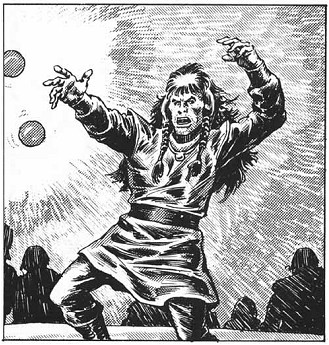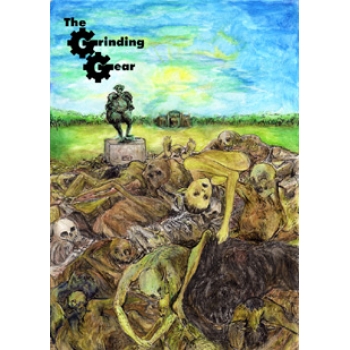As I
recently mentioned, I've been running James Raggi's the Grinding Gear for a small group. I've been running the module as a one-shot, which means that I've not had to insert it into an existing campaign -- giving me free reign on the setting. Obviously, it being a one-shot, the setting isn't that important, and hasn't played a huge role, but the vague background I've imagined is a weird fantasy-esque, early modern setting, with no demi-human PCs, no divine magic, and much more limited arcane magic than one typically finds in D&D.
This slightly atypical setting, combined with the fact that it's a one-shot (well, a two-shot now) means that I've been able to play around with a few ideas for new rules. I've already talked about the introduction of
mixed-class characters and
firearms, so the remaining (and probably most experimental) house rule is my system for fatigue-based spellcasting.
Regular readers will know by now that my favourite D&D-related pastime (well, joint favourite with actually playing the game!) is messing around with
new spells and rules for magic-users! Something of a hobby in itself ;)
I've been mulling over ideas for some time on how one could simply (i.e. without having to rewrite everything!) adapt the D&D Vancian spellcasting system to give it more of a low-magic, dangerous edge. From what I've seen of the magic system in Dungeon Crawl Classics, that's kind of the vibe he's going for, but of course that's a very involved rewrite of the magic rules and all the spells, so not what I had in mind.
At first I was contemplating some kind of spellcasting roll, with the possibility of nothing -- or varying degrees of bad / weird side-effect -- occurring if the roll fails. In the end, however, I came up with something far simpler, with a nod to Fighting Fantasy. It works as follows.
Fatigue Based Spellcasting
In the standard system of magic, as presented in traditional D&D, a magic-user's spells must be memorized in advance and vanish from his mind when cast. Thus a spell-caster's puissance is measured by the number of spells which he can fit into his memory at once.
Using this alternative system of spellcasting, a magic-user does not need to memorize spells. It is assumed that once a magic-user has mastered the formula of a spell, he is able to cast it at will, simply by performing the required gestures and incantations. However, as a counterbalance to this freedom, each spell which is cast drains the caster's reserves, leading to a creeping fatigue and listlessness.
This fatigue is simulated by a hit point cost for each spell cast, depending on its level. Thus, as a magic-user casts more spells, his ability to react in dangerous situations, and to avoid serious damage or death, is reduced.
Spell level 1 2 3 4 5 6 7 8 9
Hit point cost 1 2 4 8 12 16 20 24 28
Hit points lost due to spell-casting are recovered in a slightly different way to normal. A magic-user's player should keep track of both his current hit point total, and the sum of points which were lost due to magic use. After a full night's rest, all hit points lost as a side-effect of spells cast are restored. On the other hand, hit points lost due to spell-casting cannot be restored by healing spells or magic items.
This system enables low level casters (especially those at 1st level) to cast more spells than in standard D&D, while higher level spells, due to their large drain in hit points, will be less frequently used.
Notes
- The only problem I can imagine with this system, and a point which I'm rather unsure of, is that it makes a magic-user's maximum hit point total extremely important. A 1st level MU with one hit point would be unable to cast spells, for example, and a player who made consistently lucky rolls for hit points as his character advanced would be at a great advantage.
- I've been using the standard spell progression chart to determine the number of spells a magic-user knows, rather than how many spells he can memorize. I've doubled the numbers on the chart, so a 5th level MU would know four 1st, four 2nd and two 3rd level spells. This nicely simplifies the question of how MUs learn new spells.
- Likewise, I've allowed high INT to grant extra known spells, using the cleric chart for high WIS.
- Using this system, a few spells might need re-levelling. For example, given that a 1st level magic-user could be able to cast three spells a day, sleep is probably too powerful for a 1st level spell. I'd move it to 2nd level.






